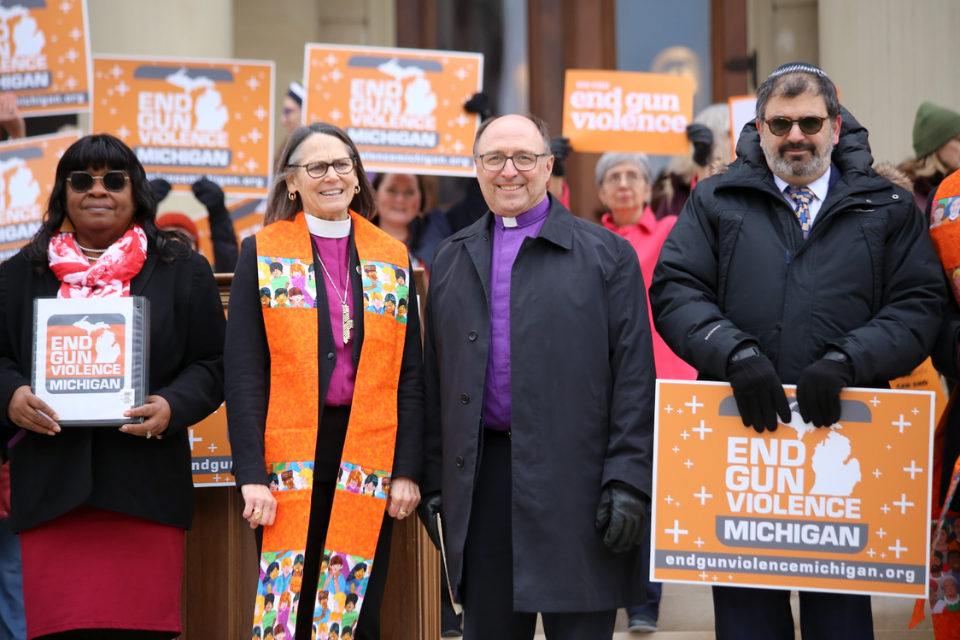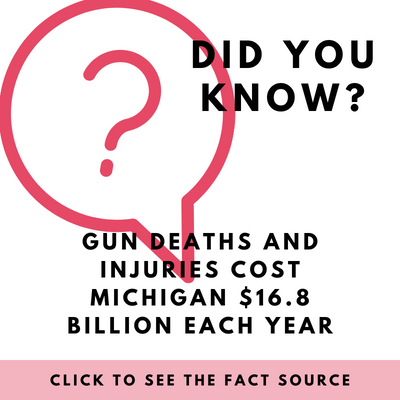The Michigan Conference has joined a growing movement seeking to make gun violence prevention a priority for state lawmakers. Are you passionate about this issue? If so, join other Michigan United Methodists for Advocacy Day on March 22 in Lansing for an opportunity to talk to your elected officials.
JAMES DEATON
Content Editor
Following the mass shootings in Asian American communities in California, which have elicited responses from United Methodists throughout the denomination, United Methodists here in Michigan are riding a new wave of advocacy that some feel has traction for lasting change.
Michigan United Methodists have joined a growing coalition of clergy, students and educators, physicians, elected officials, and community leaders calling on state legislators to prioritize the passing of common-sense legislation to curb the number of deaths related to gun violence.
There is hope that key bills, which have stalled for years without a vote, will garner bipartisan support under renewed leadership and pass during the first 100 days of the new term, which began Jan. 11. Governor Gretchen Whitmer’s State of the State address last week also spoke of the need for common-sense action, noting that “the time for thoughts and prayers is over.”
Contacting state legislators and encouraging them to put gun safety laws at the top of their agenda is something all persons of faith can do. It’s a way to infuse this growing movement with energy and purpose. And it’s how every Michigan United Methodist can make good on a promise made during last year’s Annual Conference to take action on the rise in gun violence.
One practical way to follow through is by joining other Michigan United Methodists for Advocacy Day on Wednesday, March 22, in Lansing. This day of prayer, public witness, and meetings with elected officials will focus on gun safety. And there will be three virtual training events prior to Advocacy Day where individuals will learn how to speak with elected officials.
Want to learn more about this event? Register to attend the Lunch and Learn webinar on Tuesday, Feb. 14, and join others in prayers of lament and learn about legislation and plans for Advocacy Day.

‘Reject the Idolatry of Guns’
This past summer, the Michigan Conference overwhelmingly adopted a resolution at the 2022 Annual Conference asking Michigan United Methodists to do something to reduce gun violence in our state. This was motivated, in part, by the high school shooting in Oxford, MI, on Nov. 30, 2021, when a student opened fire with a handgun killing four students and injuring six others and one teacher. Several Michigan United Methodists were directly affected by this tragedy.
The resolution adopted by the delegates encouraged all Michigan United Methodists to contact their elected officials to support legislation and funding designed to reduce gun violence, develop a coalition within the conference tasked to resource conference members in this justice work, join the End Gun Violence Michigan coalition, and plan annual Advocacy Days.
Faith-informed advocacy addressing gun violence was also on the minds and hearts of many other United Methodists last summer. The Michigan Conference was one of more than 12 annual conferences that took official action on this pressing issue.
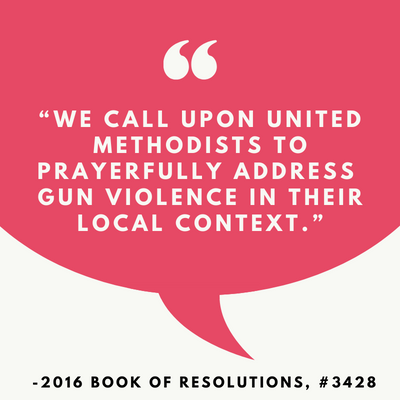 The Council of Bishops buoyed this message later in the year by issuing a Sept. 1 statement that spoke of the repercussions of gun violence on communities around the world. The letter pointed to the “global and national health crisis” caused by gun violence, where “communities are left with emotional scars that beg for angels of mercy and the healing balm of Gilead.”
The Council of Bishops buoyed this message later in the year by issuing a Sept. 1 statement that spoke of the repercussions of gun violence on communities around the world. The letter pointed to the “global and national health crisis” caused by gun violence, where “communities are left with emotional scars that beg for angels of mercy and the healing balm of Gilead.”
In addition to a call to prayer, the letter served as “a call to action for all to weep with those who weep and demand, insist on, and push for positive change from our elected officials.” It’s a way for followers of the Prince of Peace to “reject the idolatry of guns and the distorted attachment to our right to own guns without safeguards for the communities of the world.”
In November, at the North Central Jurisdictional Conference, a presentation on gun violence was given by Rev. Angelo Monte, who told stories of the impetus for his Alive Community Outreach ministry in Fort Wayne, IN. Monte noted that gun violence is “a racial and economic justice crisis and one of the greatest moral and spiritual crises of our time.” To combat this, his ministry focuses on walking with victims, educating and empowering young persons through a Peacemaker Academy in the way of nonviolence to build peace in their schools and communities, and identifying youth most at risk for perpetrating violence or being victimized.
All of these United Methodist responses within Michigan and throughout the connection are grounded in denominational statements and resolutions, such as “Our Call to End Gun Violence,” approved by the 2016 General Conference. They are also anchored in the biblical witness of God’s dream for peace for all creation, expressed succinctly in Micah 4, which depicts a world where people will transform weapons of war into gardening tools.
Making Progress in Michigan
The need for revisions to state laws that would reduce gun violence and better protect lives is a concern for United Methodists and other like-minded people of faith here in Michigan.
Last year the Michigan Conference joined End Gun Violence Michigan, a broad statewide coalition of faith and community leaders committed to change. They are making progress by calling for legislation changes and encouraging elected officials to prioritize gun safety matters while also protecting the rights of gun owners.
On Jan. 18, End Gun Violence Michigan (EGVMI) held seven events—five press conferences and two prayer vigils—across the state, calling on the Michigan legislature to pass gun violence prevention laws in their new term. Many of these proposed changes are supported by a majority of Michigan residents. The events were held in Oxford, Detroit, Grand Rapids, Kalamazoo, Lansing, Saginaw, and Marquette and featured local speakers and experts.
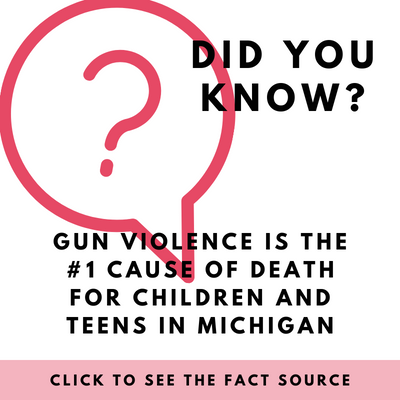 Bishop David Alan Bard joined other religious leaders on the steps of the Michigan State Capitol in Lansing to give support to this coalition and the shared advocacy work. “I stand here as a bishop,” he said, “in response to the voices in my church who have made statements asking that even if we cannot do everything, we must do something in a country where guns are now the number one cause of death among our children and teens.” Bishop Bard was referring to a research analysis of firearm-related deaths by the University of Michigan.
Bishop David Alan Bard joined other religious leaders on the steps of the Michigan State Capitol in Lansing to give support to this coalition and the shared advocacy work. “I stand here as a bishop,” he said, “in response to the voices in my church who have made statements asking that even if we cannot do everything, we must do something in a country where guns are now the number one cause of death among our children and teens.” Bishop Bard was referring to a research analysis of firearm-related deaths by the University of Michigan.
Rev. Amy Terhune, the pastor of First United Methodist Church of Saginaw, participated in a prayer vigil with other EGVMI leaders at St. John’s Episcopal Church. During the vigil, Terhune and others named all the mass shootings (four or more killed) during the past 10 years, beginning with the Sandy Hook school shooting, and the number of people killed. “It’s very sobering,” noted Terhune, “to hear one after another.” The litany lasted about 30 minutes.
First United Methodist Church hosted the EGVMI event in Kalamazoo. Rev. Julie Kline, the lead pastor, welcomed everyone at the beginning of the press conference. Several of the other events had United Methodist members speaking at or participating in the public witness.
Rev. Heather McDougall-Walsh spoke as a United Methodist clergy, a chaplain, and a member of the EGVMI steering committee. She called for the governor and state legislators to act swiftly: “Governor Whitmer, you campaigned on this issue. Many of your newly elected legislature campaigned on this issue. And there is no more clear message that it is our generation’s responsibility, not my daughter’s. And the time for change is now.”
McDougall-Walsh named the four legislative priorities that are at the heart of End Gun Violence Michigan’s advocacy and will hopefully be a top priority for elected officials:
-
- Universal background checks—Close a loophole by changing the wording in the current legislation from “handgun” to “firearm” and pass legislation requiring universal background checks for those purchasing a firearm. A recent poll conducted by EPIC·MRA showed that 90 percent of Michigan voters support background checks on all guns, not just handguns. This call for universal background checks is one of the measures “Our Call to End Gun Violence,” a United Methodist resolution approved by the 2016 General Conference, suggested congregations advocate for at the local level.
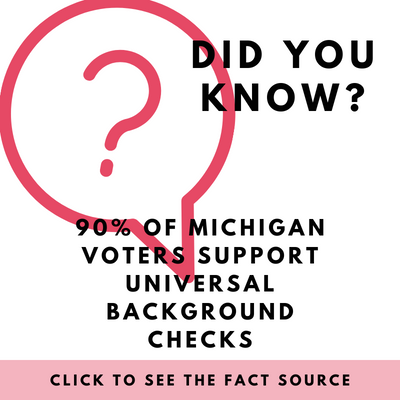
- Safe storage laws for all firearms—There is a need for clear legislation requiring gun owners to place their guns in a locking device or a secure holding place to prevent minors or anyone from accessing them. Senator Rosemary Bayer from Oxford, MI, is working with groups like the Giffords Law Center to craft the language for a new bill that will hopefully get heard in the coming days and move forward with bipartisan support from Michigan lawmakers. Additionally, EGVMI is asking the state to provide education, training, and funding to help responsible gun owners store their guns safely.
- Extreme risk protection orders—Also known as “red flag laws,” these laws would allow a judge to temporarily remove firearms from someone if the judge determines the person may be at risk for harming themselves or others with the firearm. Nineteen states and Washington, D.C., have passed such laws. What would make these laws most effective would be for there to be adequate police training on how best to deal with mental health crises and stronger penalties for people who file a false report. Governor Whitmer named extreme risk protection orders, along with universal background checks and safe storage laws, as part of her agenda in this new term.
- Restrictions on domestic abusers—Those persons who are convicted of sexual assault or domestic violence should not be able to buy firearms. Stronger legislation needs to be implemented that would better protect survivors.
- Universal background checks—Close a loophole by changing the wording in the current legislation from “handgun” to “firearm” and pass legislation requiring universal background checks for those purchasing a firearm. A recent poll conducted by EPIC·MRA showed that 90 percent of Michigan voters support background checks on all guns, not just handguns. This call for universal background checks is one of the measures “Our Call to End Gun Violence,” a United Methodist resolution approved by the 2016 General Conference, suggested congregations advocate for at the local level.
In her final comments, McDougall-Walsh concluded, “All of these are practical and logical policy strategies as legislative goals aiming to honor the desire of rights of Michigan residents to own firearms while also working to make our homes, our communities, schools, places of worship, and public gathering places safer.”
Members of End Gun Violence Michigan hope that state legislators will work together, as they have done on policy solutions to prevent acts of violence against students and teachers in our Michigan schools. Recently, the Bipartisan School Safety Task Force, comprising four Republicans and four Democrats, released their final recommendations in Dec. 2022. EGVMI believes the legislature can make significant strides in the first 100 days of this new term.
Advocacy Day Planned for March 22
The Michigan Conference is planning its first Advocacy Day for Wednesday, March 22, to follow through on its promise made last summer to equip United Methodists to take action on the issue of gun violence prevention.
Rev. Alice Fleming Townley, Mission and Justice Coordinator for the Michigan Conference, is organizing the day’s events, along with Rev. Michelle King, provisional deacon, in collaboration with the Board of Justice. Townley encourages all United Methodists not to be paralyzed by the despair heard on the news. “It is easy to feel overwhelmed and helpless,” she said. “What might happen if we come together as United Methodists across the state to build community, draw from deep spiritual wells, listen to the cries around us, discern focus, and organize?”
Advocacy Day will be held from 8 am to 3 pm at Central United Methodist Church in Lansing, across the street from the Michigan State Capitol. There will be times of worship and prayer in addition to set-aside time for pre-registered individuals to meet with elected officials and talk to them about moving forward on common sense gun safety legislative matters.
To help prepare individuals for meeting with their elected officials, the Michigan Conference is providing three pre-event trainings on March 7, 13, and 21, all done virtually. Learn more by visiting the event’s registration web page. The first one is highly encouraged and will be recorded so that it can be viewed later if it’s not possible to attend live. The second and third ones, on March 13 and 21, are required if people plan to meet with their elected officials.
For those ready to participate, complete this simple registration form now so that we can ensure appointments can be made with our state lawmakers. There is a $20 fee to help cover refreshments, lunch, and administrative costs involved in the event’s planning. Scholarships are available. Once you register for this event, you will also be registered for the pre-event trainings automatically. Contact Alice Townley at [email protected] or Michelle King at [email protected] with any questions.
After Advocacy Day in Lansing on March 22, participants will be invited to debrief and dream next steps in a virtual gathering on Tuesday, March 28.
Those who would like to explore further, with no commitment, click here to register for the 30-minute Lunch and Learn: From Prayers to Action on Gun Safety on Tuesday, Feb. 14, beginning at 12:15 pm. Learn about current End Gun Violence Michigan policy recommendations and how to participate in the Michigan Conference’s first Advocacy Day training and events.
Last Updated on December 8, 2023

